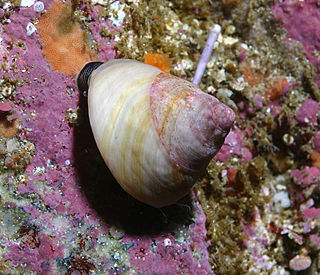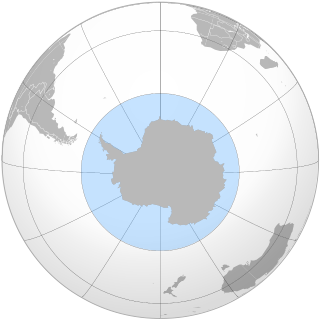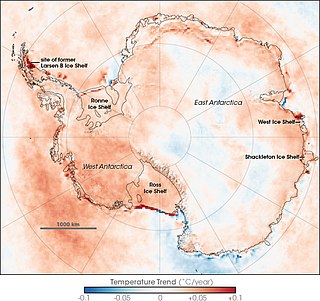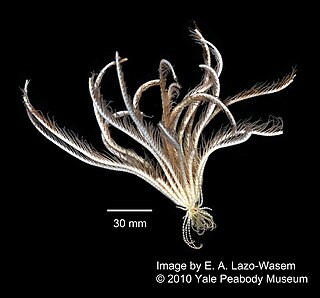
The Antarctic is a polar region around Earth's South Pole, opposite the Arctic region around the North Pole.

The Ross Sea is a deep bay of the Southern Ocean in Antarctica, between Victoria Land and Marie Byrd Land and within the Ross Embayment, and is the southernmost sea on Earth. It derives its name from the British explorer James Clark Ross who visited this area in 1841. To the west of the sea lies Ross Island and Victoria Land, to the east Roosevelt Island and Edward VII Peninsula in Marie Byrd Land, while the southernmost part is covered by the Ross Ice Shelf, and is about 200 miles (320 km) from the South Pole. Its boundaries and area have been defined by the New Zealand National Institute of Water and Atmospheric Research as having an area of 637,000 square kilometres (246,000 sq mi).

The Convention on the Conservation of Antarctic Marine Living Resources, also known as the Commission for the Conservation of Antarctic Marine Living Resources, and CCAMLR, is part of the Antarctic Treaty System.

Durvillaea antarctica, also known as cochayuyo and rimurapa, is a large, robust species of southern bull kelp found on the coasts of Chile, southern New Zealand, and Macquarie Island. D. antarctica, an alga, does not have air bladders, but floats due to a unique honeycomb structure within the alga's blades, which also helps the kelp avoid being damaged by the strong waves.

Trochoidea is a superfamily of small to very large vetigastropod sea snails with gills and an operculum. Species within this superfamily have nacre as the inner shell layer. The families within this superfamily include the Trochidae, the top snails. This superfamily is the largest vetigastropodan superfamily, containing more than 2,000 species.

Antarctica is Earth's southernmost and least-populated continent. Situated almost entirely south of the Antarctic Circle and surrounded by the Southern Ocean, it contains the geographic South Pole. Antarctica is the fifth-largest continent, being about 40% larger than Europe, and has an area of 14,200,000 km2 (5,500,000 sq mi). Most of Antarctica is covered by the Antarctic ice sheet, with an average thickness of 1.9 km (1.2 mi).

Pendromidae is a family of gastropods in the clade Vetigastropoda.

The Southern Ocean, also known as the Antarctic Ocean, comprises the southernmost waters of the world ocean, generally taken to be south of 60° S latitude and encircling Antarctica. With a size of 20,327,000 km2 (7,848,000 sq mi), it is regarded as the second-smallest of the five principal oceanic divisions: smaller than the Pacific, Atlantic, and Indian oceans but larger than the Arctic Ocean. Since the 1980s, the Southern Ocean has been subject to rapid climate change, which has led to changes in the marine ecosystem.
Rugulina monterosatoi is a species of sea snail, a marine gastropod mollusc in the family Pendromidae.

Rugulina is a genus of sea snails, marine gastropod molluscs in the family Pendromidae.

Ganesa is a genus of sea snails, marine gastropod mollusks in the family Skeneidae.

Granigyra is a genus of sea snails, marine gastropod mollusks, unassigned in the superfamily Seguenzioidea.
Fossarus is a genus of sea snails, marine gastropod mollusks in the family Planaxidae.

Tommaso di Maria Allery, marchese di Monterosato was an Italian malacologist.
Rugulina ignobilis is a species of sea snail, a marine gastropod mollusk in the family Pendromidae.
Rugulina tenuis is a species of sea snail, a marine gastropod mollusk in the family Pendromidae.

Rugulina verrilli is a species of sea snail, a marine gastropod mollusk in the family Pendromidae.

The wildlife of Antarctica are extremophiles, having adapted to the dryness, low temperatures, and high exposure common in Antarctica. The extreme weather of the interior contrasts to the relatively mild conditions on the Antarctic Peninsula and the subantarctic islands, which have warmer temperatures and more liquid water. Much of the ocean around the mainland is covered by sea ice. The oceans themselves are a more stable environment for life, both in the water column and on the seabed.

Temperature change due to climate change in Antarctica is not stable over the whole continent. West Antarctica is warming rapidly, while the inland regions are cooled by the winds in Antarctica. Water in the West Antarctic has warmed by 1 °C since year 1955. Further increase in temperature in water and on land will affect the climate, ice mass and life on the continent and have global implications. Present-day greenhouse gas concentrations are higher than ever according to ice cores from Antarctica, which indicates that warming on this continent is not part of a natural cycle and attributable to anthropogenic climate change.

Promachocrinus is a genus of free-swimming, stemless crinoids. It is a monotypic genus, and the only species in the genus is Promachocrinus kerguelensis. This is a coldwater crinoid which is found in the seas around Antarctica and surrounding island groups, including under the sea ice.













